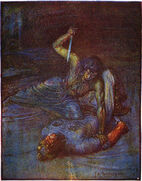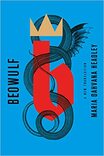| I recently read two very different translations of the ancient Angle-Saxon epic, Beowulf, which spurred me to do a deeper dive into the character of the antagonist Grendel’s unnamed mother. The poem tells the story of a Nordic hero, Beowulf, who travels to Denmark to defeat the monster Grendel, who is murdering warriors of a Danish king. Beowulf wrestles Grendel bare-handed and gives him a mortal wound. The next night, Grendels’ mother kills one of the Danish king’s advisors to avenge her dead son. She is then killed the next evening by Beowulf according to the text. |
| Maria Dahvana Headley, in her wonderfully fresh Beowulf: A New Translation, notes that both the hero Beowulf and his nemesis Grendel are referred to by the term algaeca, usually translated as “hero” for Beowulf and “monster” when referring to Grendel--or his mother. According to Dahvana Headley, this word is “likelier to mean something akin to ‘formidable’.” Grendel’s mother is referenced in the poem as ides, aglaec-wif, meaning “formidable noblewoman.” |
Dahvana Headly says: “Grendel’s mother doesn’t behave like a monster. She behaves like a bereaved mother who happens to have a warrior’s skill.” Grendel’s mother “lives in a hall, uses weapons, is trained in combat, and follows blood-feud rules.”
In his extensive blog on Beowulf, Nicholas Zacharewicz adds that “Grendel’s mother only kicks into action once she learns that her son has been killed. So she’s plainly motivated by revenge and the sort of anguished sorrow that only a parent who loses a child can really know.”
In his extensive blog on Beowulf, Nicholas Zacharewicz adds that “Grendel’s mother only kicks into action once she learns that her son has been killed. So she’s plainly motivated by revenge and the sort of anguished sorrow that only a parent who loses a child can really know.”
| In Grendel’s Heroic Mother, Kevin Kiernan observes that she "accepted and adhered to the heroic ethic of the blood-feud . . . exacting retribution for the death of her son. In heroic terms, her vengeance for the death of her kinsman Grendel." Blood-feud was considered an honorable exercise at the time, and would have been understood as such by the poem’s audience. |
| Kiernan further notes that Grendel and his mother belong to a class of people called eotens. He notes that Beowulf “destroyed a race of eotens” prior to the poem's action and was sent to Denmark as an eotenweard, a “guard against eotens.” The poem also mentions a hero Sigemund who had “slain with swords a great many races of eotens.” This suggests underlying racism driving the poem’s storyline. |
I can’t help but wonder if Grendel and his mother, relegated to the fens and bogs on the outskirts of the Danish king’s land, were in fact the original inhabitants--demonized by their conquerors in the all-too-familiar trope of colonialism. Viewed through this lens, the actions of both Grendel and his mother against their oppressors become sympathetic--and their defeat at the hands of Beowulf (the true monster of the tale?) become tragic rather than easily justifiable.





 RSS Feed
RSS Feed